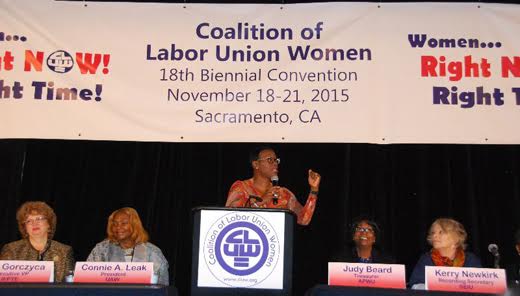
SACRAMENTO (PAI) – “The expression, ‘Knowledge is power’ – a guiding principle on which the Coalition of Labor Union Women (CLUW) was founded in 1974 – continues to lead CLUW today,” coalition President Connie Leak says. “And CLUW over the years has extended that commitment to women’s health.”
To advance that goal, the convention’s 500+ delegates renewed and increased the organization’s commitment to provide union women with health information. Their decision, adopted at the CLUW convention in Sacramento last month, sent them home with knowledge about women’s health for themselves their union sisters.
“CLUW’s primary focus is on empowering women at work and in their unions. In recent years our leadership has broadened that commitment to include the health of union women, as we know that when women have access to quality, easy-to-understand and up-to-date health information, they live longer, are more productive and have better quality lives,” Leak explains.
“It is also well known that women – often the chief medical health officers of their families – tend to neglect their own health,” adding, “And union women are no different.”
A plenary panel on Union Women and Health featured information on three specific issues: The Spread the Word about Heart Disease campaign, CLUW’s recent women’s health survey, and mental health in the workplace. Another panel covered job safety and health.
Kim Newlin, a cardiovascular nurse practitioner and clinical manager of Cardiac and Pulmonary Rehab at Sutter Roseville Medical Center, shared an all-too-common story about a physically active 37-year-old mother who felt jaw tightness when running over the last two years, a known warning sign of coronary artery disease (a blockage in the heart artery).
After visiting for chest pain, she was treated for gastrointestinal issues and sent home, only to return two days later with worse chest pain. Her lab tests indicated that she had had a heart attack and a 99 percent blockage in one of her main coronary arteries.
Newlin said knowing the signs and symptoms of coronary artery disease is every woman’s responsibility both for herself and for her loved ones. She urged each person to be an educated advocate on the issue through resources like the Spread the Word website, which makes the point that heart disease is “not just a man’s disease.”
She also outlined the American Heart Association’s “Life’s Simple Seven” steps to achieving ideal wellness can reduce incidence of cancer by 20 percent, chronic kidney disease by 62 percent), pneumonia by 43 percent and chronic obstructive pulmonary disease by 49 percent. She added, however, “do not let the thought of having to do seven things overwhelm you” and suggested “starting with one or two.”
Eve Dryer, board chair of HealthyWomen-which co-sponsored, with CLUW, the women’s health survey that ran earlier in 2015 — said the two will inaugurate a special women’s health resource on CLUW’s website in early 2016. The resource will respond to results from the 2,035 union women who answered the survey.
Kimberly Mayer, associate director of the California Institute for Behavioral Health Solutions, said mental health is also a key issue for working women. That’s because one in five U.S. adults experiences, one of every 10 young people “experience a period of major depression” and “one in 25 Americans lives with a serious mental illness. And suicide is the 10th leading cause of death in the U.S., taking more than 41,000 lives yearly.
Mayer noted workers often cannot leave mental health problems at home when a going to work. She observed the stigma attached to having a psychiatric disorder means that people are reluctant to seek treatment. She also told the audience that it is not unusual to see that a fellow worker might have an mental health issue and although “you want to help, you might not be sure how…” Mayer distributed national resources union members can use to help themselves and others.
CLUW New Jersey President Cecelia Gilligan Leto, a project coordinator for the New Jersey Work Environment Council, led the occupational safety and health workshop. She stressed the importance of women being educated on federal and state laws that govern workplace safety.
Participants learned the same groups attacking a woman’s right to choose also look to roll back funding for workplace safety and health enforcement, claiming it is too expensive for employers to follow safety standards.
Leto stressed the economic impact of a woman being injured on the job is “devastating to the entire family unit.” She added that “women who are single parents, struggling to provide basic needs for themselves and their children, can be one workplace injury away from poverty and being left with no one to care for, or play with their children.”
Amy Everitt and Rebecca Griffin of NARAL Pro-Choice California updated delegates on the fight to preserve reproductive rights – and how the war on that and on family benefits attacks working women. Their “take away” was that there is no such thing as economic security without reproductive freedom.
Nationwide, “we are seeing the impacts of decreased access to abortion and diminishing resources for reproductive health services – which leads to less money spent on creating conditions for economic opportunity and support for families struggling to get by,” they said. Participants at their workshop put together action plans to make their unions aware of the connection between economic security and reproductive freedom.
Convention delegates also adopted a number of resolutions related to women’s health, including “Clean Drinking Water is a Human Right,” “Spread the Word on Coronary Artery Disease,” “Stand with Planned Parenthood,” and “Let’s Get Real Family Values.”












Comments